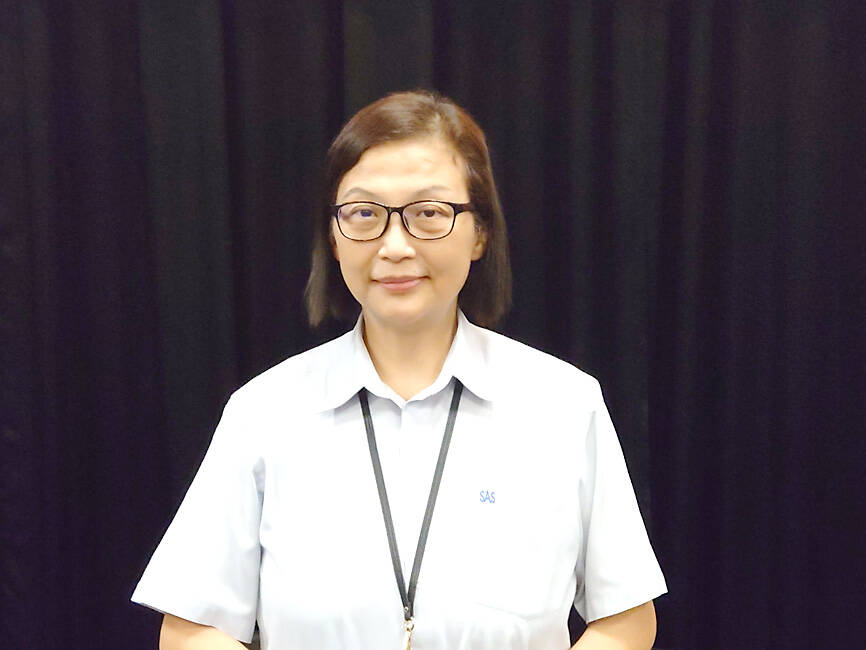GlobalWafers Co (環球晶圓), the world’s third-largest silicon wafer supplier, yesterday said that revenue growth this year would be flat or would increase by a low to mid-single-digit percentage, as several of its customers contend with inventory issues.
That forecast indicates that the company this year would likely report its weakest growth in revenue since 2020.
“Overall, the silicon wafer market has entered a period of slowdown. This period has lasted for about four quarters with the silicon wafer market lagging the semiconductor market by one to two quarters due to inventory digestion issues,” GlobalWafers chairwoman Doris Hsu (徐秀蘭) told investors in a teleconference meeting.

Photo: CNA
“Many of our customers are still digesting their inventories,” Hsu said. “Nobody really knows whether the market will recover in the second half of this year or next year. Visibility is still low.”
However, she said that GlobalWafers would enter another upcycle next year with revenue returning to previous growth patterns on an annual and quarterly basis.
Separately, the company said it has received a notice from the US government that is being included in the first phase of applicants for Washington’s Creating Helpful Incentives to Produce Semiconductors and Science Act, alongside Taiwan Semiconductor Manufacturing Co (台積電).
Previously, GlobalWafers was categorized as a material supplier and deemed a phase-two company for the act. Phase-two applicants are reviewed for investment subsidies after phase-one companies.
As a phase-one applicant, GlobalWafers is eligible for the US Department of the Treasury’s advanced manufacturing investment tax credit, the company said.
GlobalWafers has submitted its pre-application to the US government and would have a final application ready by the end of the fourth quarter, it said.
The construction of a new 12-inch wafer plant in Texas is on schedule and on track to start volume production in 2025, the company said.
GlobalWafers plans to invest US$5 billion in the Texas fab.
The company reported that net profit in the second quarter dropped 4.2 percent to NT$4.79 billion (US$152 million), from NT$5 billion in the first quarter. On an annual basis, net profit surged 73 percent from NT$2.72 billion.
Earnings per share dropped to NT$11 last quarter from NT$11.49 in the first quarter, but was greater than the NT$6.24 posted a year earlier.
Gross margin sank to 37.7 percent last quarter, compared with 40.6 percent a quarter earlier and 43.6 percent a year earlier.
Although some customers are still in deep inventory corrections, GlobalWafers said that prepayments had risen NT$1.5 billion as of June 30. Customers are required to pay an unspecified amount of payment in advance to secure long-term wafer supply at fixed prices.
The company accumulated prepayments of NT$38.3 billion in the first half of this year, it said.

Shiina Ito has had fewer Chinese customers at her Tokyo jewelry shop since Beijing issued a travel warning in the wake of a diplomatic spat, but she said she was not concerned. A souring of Tokyo-Beijing relations this month, following remarks by Japanese Prime Minister Sanae Takaichi about Taiwan, has fueled concerns about the impact on the ritzy boutiques, noodle joints and hotels where holidaymakers spend their cash. However, businesses in Tokyo largely shrugged off any anxiety. “Since there are fewer Chinese customers, it’s become a bit easier for Japanese shoppers to visit, so our sales haven’t really dropped,” Ito

The number of Taiwanese working in the US rose to a record high of 137,000 last year, driven largely by Taiwan Semiconductor Manufacturing Co’s (TSMC, 台積電) rapid overseas expansion, according to government data released yesterday. A total of 666,000 Taiwanese nationals were employed abroad last year, an increase of 45,000 from 2023 and the highest level since the COVID-19 pandemic, data from the Directorate-General of Budget, Accounting and Statistics (DGBAS) showed. Overseas employment had steadily increased between 2009 and 2019, peaking at 739,000, before plunging to 319,000 in 2021 amid US-China trade tensions, global supply chain shifts, reshoring by Taiwanese companies and

Taiwan Semiconductor Manufacturing Co (TSMC) Chairman C.C. Wei (魏哲家) and the company’s former chairman, Mark Liu (劉德音), both received the Robert N. Noyce Award -- the semiconductor industry’s highest honor -- in San Jose, California, on Thursday (local time). Speaking at the award event, Liu, who retired last year, expressed gratitude to his wife, his dissertation advisor at the University of California, Berkeley, his supervisors at AT&T Bell Laboratories -- where he worked on optical fiber communication systems before joining TSMC, TSMC partners, and industry colleagues. Liu said that working alongside TSMC

TECHNOLOGY DAY: The Taiwanese firm is also setting up a joint venture with Alphabet Inc on robots and plans to establish a firm in Japan to produce Model A EVs Manufacturing giant Hon Hai Precision Industry Co (鴻海精密) yesterday announced a collaboration with ChatGPT developer OpenAI to build next-generation artificial intelligence (AI) infrastructure and strengthen its local supply chain in the US to accelerate the deployment of advanced AI systems. Building such an infrastructure in the US is crucial for strengthening local supply chains and supporting the US in maintaining its leading position in the AI domain, Hon Hai said in a statement. Through the collaboration, OpenAI would share its insights into emerging hardware needs in the AI industry with Hon Hai to support the company’s design and development work, as well